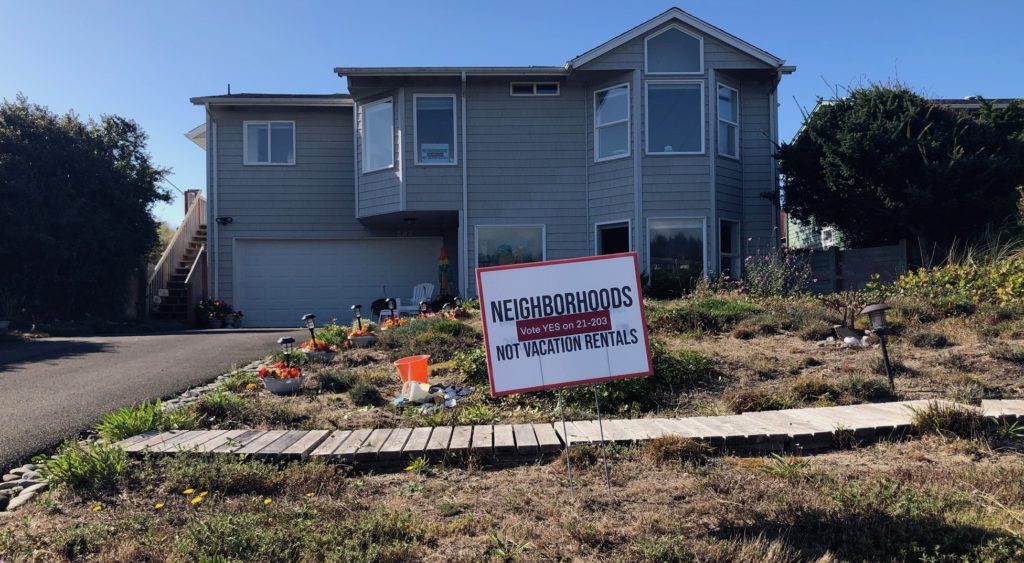
By QUINTON SMITH/YachatsNews.com
Lincoln County voters will be inundated with advertising, post cards, phone calls, texts and emails the next two weeks as proponents and opponents of a ballot measure to phase out short-term rentals in some parts of the county gear up their campaigns.
While voters throughout the county — including cities like Yachats, Waldport, Newport and Lincoln City also get to weigh in on the issue — the measure applies only to the 523 licensed rentals in unincorporated areas outside of cities.

Ballots from the county should be reaching mailboxes this weekend. They are due back — mailed or dropped off at special boxes at city halls throughout the county — to the Lincoln County elections department before 8 p.m. Nov. 2
The issue has been percolating for three years as the use and ownership of vacation rentals grew in popularity and the number of licenses in the unincorporated area more than tripled as cities along the coast established limits or tightened their own restrictions.
The initiative, which required 1,454 signatures to get on the ballot, grew out of a coalition of neighborhoods’ frustration with how Lincoln County commissioners initially handled and then delayed their work on new regulations.
Now, after four months of no discussion, commissioners expect to adopt new rules by the end of October, just days before votes are counted.
The issue has roiled rural subdivisions and neighborhoods, especially those areas on the west side of U.S. Highway 101, pitting some of them against vacation rental owners and management companies.
The short campaign has also drawn an unprecedented amount of contributions to fight the measure, including $200,000 from Meredith Lodging and $25,000 from a California political action committee formed by Airbnb.
What the initiative would do
If approved by voters, the initiative would:
- Apply only in the unincorporated areas of the county, not cities;
- Prohibit the county from issuing new short-term rental licenses in residential neighborhoods zoned for residential (R-1-A, R-1 and R-2) use.
- Make short-term rentals in the three zones “non-conforming uses,” be limited to owners of record at the time the use became non-conforming, would not be transferable to new owners, and would be phased out within five years, with some hardship exemptions available.
- Provide a process in which owners of property in R-1-A, R-1 and R-2 subdivisions petition the county to be re-zoned to allow for short-term rentals.
- Limit people to one ownership interest in a short-term rental within the R-1-A, R-1 and R-2 zones.
- Decrease the county’s current rental occupancy limits from three per sleeping area plus an additional two people, to two persons per sleeping area. Overall occupancy would be based upon the number of bedrooms, parking spaces, and septic system capacity.
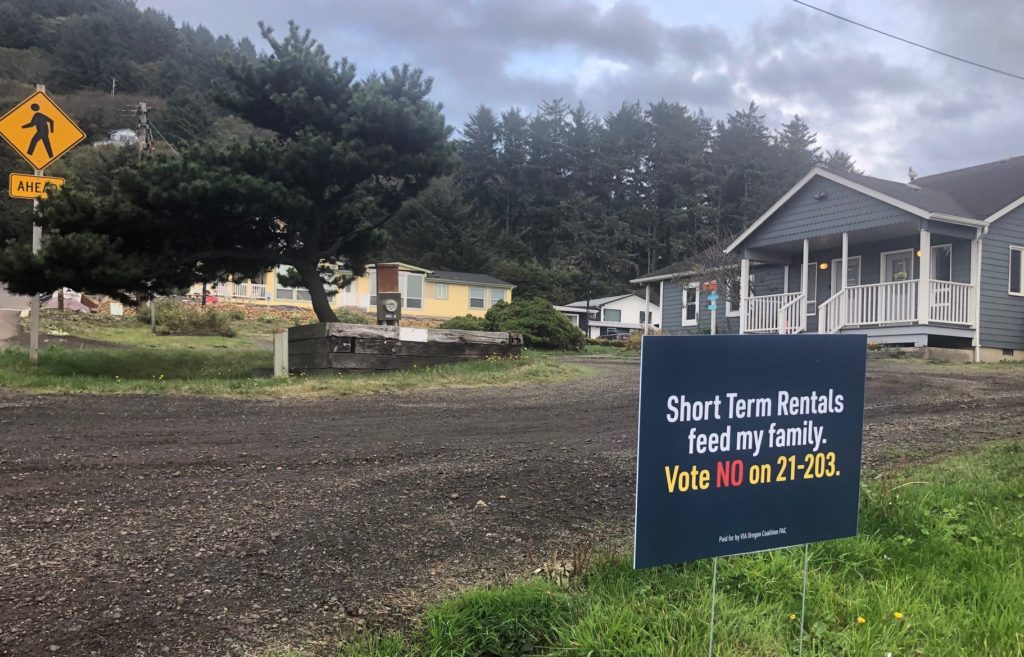
The campaign and its players
Signatures for the initiative were gathered over months by a coalition called 15neighborhoods. It is led by Monica Kirk, a retired attorney who lives in a small subdivision at the base of Otter Rock just south of Depoe Bay.
The group wants vacation rentals out of residential areas, calling them “mini-motels” that harm the character of neighborhoods while operating as a business on county-issued licenses with loose county regulations and a sheriff’s office that struggles with enforcing compliance.
15neighborhoods has a website, beefed up for the Nov. 2 campaign. According to the Oregon Secretary of State’s office, it has received $21,000 so far in contributions for an election effort that plans to use local advertising, a mailing, letters, and phone banks to contact potential voters.
The group is focusing on its contention that unlimited vacation rentals damage the livability of residential neighborhoods, and fighting arguments that passage of the measure will greatly harm the local economy or could be easily challenged in court.
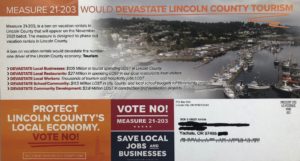
To counter the group, vacation rental managers and owners formed Via Oregon last year to make its case that vacation rentals – with proper enforcement – can work in neighborhoods. They are focusing much of their campaign on the financial impact of vacation rentals, contending they are critical to Lincoln County’s large tourism economy that affects everything from property and lodging taxes, to housecleaners to gift shops and restaurants to home repair companies.
Via Oregon has also geared up for the campaign, expanding content on its website, advertising in local media and mailing flyers to Lincoln County voters. It has received contributions of $80,000, according to the Oregon Secretary of State’s office, including $25,000 from a California political action committee formed by Airbnb.
Rather than join the Via Oregon effort, another political action group financed almost solely by Meredith Lodging of Lincoln City has been formed to campaign against the ballot measure. Save Lincoln County Jobs has received $202,800 so far, according to state reports, with $200,000 of that coming from Meredith.
The history and county’s effort
The pros and cons of Ballot Measure 21-203 cannot be un-linked from Lincoln County’s stuttering effort to tighten its 5-year-old regulations.
Lincoln County commissioners began licensing and regulating vacation rentals in 2016.
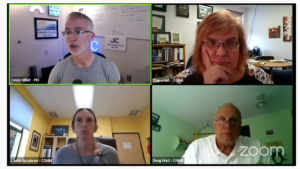
Recognizing the rapidly increasing number and rise in complaints, county commissioners began working in early 2019 to tighten those regulations. In March 2020 it put a moratorium on new licenses – it has been extended four times and is now scheduled to end Nov. 30 — and started holding workshops to gather comments.
Since the moratorium, the number of licenses in unincorporated areas has dropped to from just over 600 to 523 due mostly to the inability to transfer licenses after a change in ownership.
But the start of the coronavirus pandemic in March 2019 and September 2020 wildfires in Otis delayed much of the work.
Last November, County Counsel Wayne Belmont came back to commissioners with suggestions in four areas that represented a much further tightening than previous ideas.
Belmont’s suggestions included a limit on the number of licenses, which has since been refined to establish different limits in seven areas of the county. It would also dial back occupancy limits, currently one of the most lenient in Oregon; require septic system inspections and establish capacity limits for any vacation rental using one; and create an administrative hearings officer to handle complaints and establishing a “three strikes” program to pull licenses of chronic offenders.
After dropping the discussion in late May, commissioners resumed looking at Belmont’s proposals in September. This week commissioners had their first reading of the amended ordinances and are scheduled to vote on the final versions Oct. 27 – six days before votes on Measure 21-203 are counted.
If there is one thing that 15neighborhoods and Via Oregon agree on it is their anger over the commissioners’ last-minute resumption of work on the ordinances just as their campaigns are beginning.
For and against, in their own words
To let both sides of the measure make their arguments in their own words, YachatsNews sent them nine questions.

Here are responses by 15neighborhoods
Question: Why did your group put this initiative on the ballot?
Answer: We got tired of seeing our neighborhoods hollowed out for the profits of a few while more and more of our residents can’t find housing at any price. We are a grassroots group of folks who actually live and work here in Lincoln County, and we care deeply about our community.
Our involvement in working to find a solution goes back to the 2016 refusal by Lincoln County commissioners to enforce its own residential zoning laws. The creation of a business license regulation for short-term rentals did not solve the zoning violation issue. It opened the floodgates to allow businesses to operate, and expand, in the unincorporated residential zones of Lincoln County.
We followed the county’s lead. Ballot Measure 21-203 is based on the business license approach. Because the county used its licensing rather than zoning authorities, the county does not have to compensate short-term rental investors when the phase-out becomes effective in five years. A license is not a property right in Oregon. Commissioner Doug Hunt’s fear and the oppositions’ lies about Measure 49 and “takings” are unfounded.
Q: Opponents of this measure are painting as an economic issue. How do you answer that argument?
A: It is partly an economic issue. But it is also largely a livability issue because single-family residential neighborhoods are being overrun by an invasion of mini-motels. The economic truth is that a small handful of wealthy individuals and corporations, most from outside of Lincoln County, want to siphon tourism dollars out of our county. Voters need to ask why these outsiders are raising hundreds of thousands of dollars to spread blatant lies about what this ballot measure actually does.
Most of the profits generated by short-term rentals do not even pass through Lincoln County, going directly to owners and the internet listing companies that are based elsewhere. This measure still allows STR investment in the county, but in areas zoned for lodging businesses, not single-family residential zones
We in Lincoln County are blessed to have a diverse economy, from our fisheries to our forests. Tourism is also very important, but we cannot let vacation rentals ruin neighborhoods and take needed housing from our local workforce for the profit of outside investors.
Q: There are about 530 licensed short-term rentals in unincorporated Lincoln County. How many do you think passage of this measure would affect (the number in R1/R2 zones)?
A: It would phase out short-term rentals in those zones over a five-year period. We don’t know the number because the county does not track the zoning when it licenses them. But most STRs are in cities and would not be affected at all by this measure.
We want to underscore that our opponents are knowingly spreading false information about this point. This measure, as clearly stated in the voter pamphlet, only applies to unincorporated parts of Lincoln County. Furthermore, this measure still allows STR investment in areas zoned for lodging businesses, just not in single-family residential zones.
However, our opponents claim on their website and advertising that it would “phase out all short-term rentals in Lincoln County.” Why are a handful of wealthy outsiders lying to voters? Voters need to read the voter pamphlet they will receive from the county to see what the measure actually will do, not rely on misleading ads.
Q: The measure would allow a process for the “down zoning” of R1/R2 subdivisions to allow short-term rentals. Who could initiate that and how would that process work?
A: If a majority of residents in a subdivision decide they want short-term rentals, they can petition the county to change their zoning from residential to a zone that allows such businesses. This down-zoning (part of the ballot measure) is never mentioned by our opponents. It is an option for those neighborhoods that want to retain businesses in their unincorporated area.
Q: One part of the measure would limit people to owning one short-term rental in an R1/R2 zone. Explain that, please, and why.
A: This provision was added to help keep investors from essentially buying up a neighborhood. Some neighborhoods have already seen the early stages of this when investors and a rental company tried to change an entire neighborhood into a resort.
Q: Both sides of this issue are critical of Lincoln County’s current compliance procedure. Win or lose, how would you propose to fix that?
A: First, the licensing and enforcement of STR ordinances should not be administered through the sheriff’s department, which is primarily concerned with criminal issues. No other county or city has expected their sheriff’s department to assume this additional responsibility for civil concerns.
The county needs to learn from places that have effective regulations and adopt strict reporting requirements. That would require companies to provide information about renters that would allow enforcement personnel to easily check on the status of each rental instead of simply taking the word of whoever comes to the door. Other jurisdictions have done this effectively. Lincoln County needs to look into what works elsewhere and adopt effective methods instead of the futile system it has now. It needs to add staff, and increase fees and fines to pay for it. And it needs to get tough on scofflaws.
Q: Some people say this will (or could) be challenged in court as a land-use “takings” issue. Do you agree? Or, what is your defense?
A: This is not a “takings” issue. Nearly every provision in this measure has already been enacted in one or more Oregon local jurisdictions, and has withstood legal challenges so far. Our land-use attorney points out that takings are hard to establish, and that this measure would be restricting business use of houses, not normal residential uses for which houses are built in residential zones. Besides, “licenses” are not the type of property that Measure 49 covers.
Q: Lincoln County commissioners are working on regulations to limit short-term rentals by decreasing the numbers of licenses in certain zones. What do you think of their direction and progress?
A: It is too little, and very late. A main goal of the ballot measure is to phase these disruptive businesses out of residential neighborhoods to restore livability and character. The county’s proposal would still leave some residential neighborhoods with 40 percent or more short-term rentals.
We have tried to work with the Board of Commissioners to find a solution to this problem for over two years, but they have refused to act until now. We appreciate that they finally unanimously agree that unchecked proliferation of residential short-term rentals is a problem.
However, by weighing in at the last hour, they are unfairly attempting to put their thumb on the scale and preempt the will of voters. Moreover, many believe that their ‘solution’ will only make the problem worse. Measure 21-203 is a product of over two years of analysis, and it is the only viable solution to restore the character and livability of residential neighborhoods.
Q: Summarize why voters why they should vote “yes” on the measure:
A: A “Yes” vote on Measure 21-203 is a vote for restoring a robust and resilient economy, family-friendly neighborhoods, and more available housing. As mentioned above, we are a grassroots group of folks who actually live and work here in Lincoln County, and we care deeply about our community.
Meanwhile, a small group of wealthy outsiders is spending hundreds of thousands of dollars through political action committees to spread falsehoods about this common sense measure, all to protect the profits they are siphoning out of our County and out of Oregon.
Voters can get the facts at 15neighborhoods.com, where we have a detailed “frequently asked questions” page, and a link to the official Lincoln County voter pamphlet.
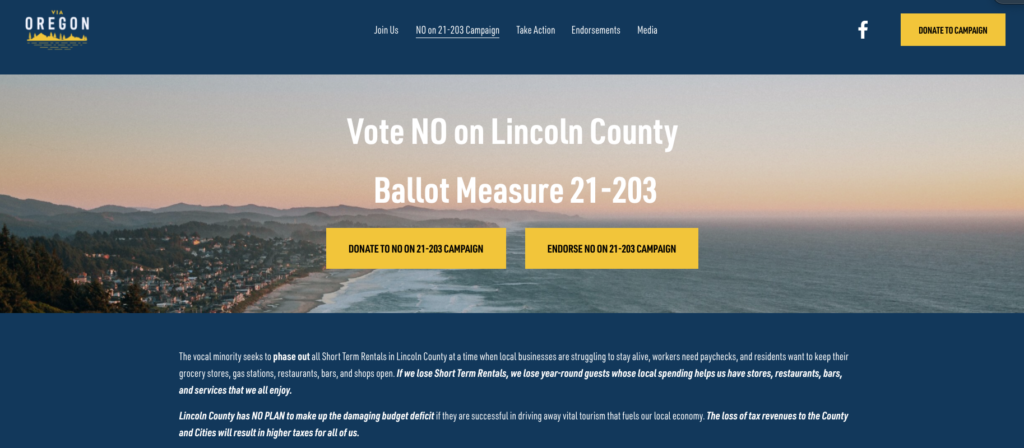
Here are responses by Via Oregon
Question: Why do you think this measure got on the ballot?
Answer: A vocal minority, 15Neighborhoods, has been effective in spreading inflated, dramatic tales through community news outlets that short-term rental houses run amok. Their not-in-my-backyard messaging, without data to back up their claims, has led enough residents to believe rentals are the reason for all of Lincoln County’s livability issues. The fact is that when the county closed vacation rentals in 2020 for two months during the COVID surge, it plunged the county into over 25 percent unemployment. They refuse to look at the real, financial impacts on those who work in this community.
Q: ViaOregon and others opposed to BM 21-203 are stressing that this is an economic issue. Explain that, please.
A: We believe it is reckless and selfish to vote “yes” without considering the financial effect on working families who support themselves with jobs caring for short-term rentals.
The measure will also cut off substantial tax revenue for Lincoln County government. Per county sourced data, short term rentals in unincorporated Lincoln County contributed nearly $3.3 million to the budget in fiscal 2020-21, is projected to be $3.6 million in 2021-22 and is budgeted to be $4.9 million in 2022-23.
Countywide, all short-term rentals provide 20 percent of employment (nearly 4,000 jobs), pump $27 million into local dining, nearly $4 million in local construction and renovation. The list goes on.
We have continually urged county commissioners to generate more economic analysis and provide more data so voters can properly understand financial impacts of phasing out short-term rentals. Proponents have no plan on how to make up these deficits if the measure passes.
Q: What is the role of short-term rentals in Lincoln County’s tourist economy? Why have their numbers increased so much in the past 3-4 years?
A: We’d like to set the record straight. It is simply not true that number of short-term rentals have increased over the past few years, because the county only started licensing and counting rentals in 2017. Over the last two years, the number has actually decreased as the county has stopped issuing new licenses. Because the county put a moratorium on new licenses in March 2020, the count is now 523 according to the most recent numbers from the sheriff’s office.
Q: Ballot Measure 21-203 would phase out short-term rentals in R1/R2 zones. Would Via Oregon endorse some sort of limit (or cap) in residential neighborhoods of unincorporated Lincoln County? Why or why not?
A: Most existing rentals are successful because they offer direct recreational access, wonderful views, and/or an oceanfront or other waterfront location. Caps could be used appropriately in neighborhoods where houses are less expensive, lack scenic views or recreational access. That would preserve more access to housing for the local workforce, which is a big concern for the community.
We also support the county using lodging tax revenue from vacation rentals to build affordable, workforce housing. Our county has always been a special balance of retirees, working families, and second homeowners, and we support balancing the rights of all county stakeholders.
Q: There are about 523 licensed short-term rentals in unincorporated Lincoln County. How many do you think passage of this measure would affect (the number in R1/R2 zones)?
A: Because of the county’s moratorium on new licenses, the number has dropped from more than 600 to 523. That is 3.6 percent of all housing units, according to the county. According to U.S. Census data, one-third of housing units are second homes, not occupied by anyone year-round.
This measure is designed to ban all vacation rentals in unincorporated Lincoln County. It doesn’t take a crystal ball to envision property owners operating “underground” if the measure passes. That’s a loss for everyone, in tax revenue and in regulation compliance. If you asked the county at any time prior to 2017, “can I operate a vacation rental in a residential neighborhood” the answer was yes.
Q: Several people say there are legal flaws in BM 21-203 that will or could be challenged in court. Do you agree? On what basis?
A: Lincoln County Counsel Wayne Belmont has warned several times that the effort to ban STR’s could, in his legal opinion, “lead to litigation and county exposure to monetary claims.” Oregon land-use law protects property owners from having counties take away an existing, lawful use of their property. It will waste taxpayer money to put the county is a position of defending a ballot measure they know is likely to be unenforceable in court.
Q: Both sides of this issue are critical of Lincoln County’s current compliance procedure. Pass or fail, how would you propose to fix that?
A: No one benefits from a disruptive party house. We support working with law enforcement to ticket guests and enforce immediate eviction if guests violate the noise or occupancy ordinance.
During the shutdown, there was a rash of enforcement calls to Lincoln County about “party” houses. Every call the sheriff took was either not a vacation rental at all, was not in their jurisdiction, or was a second homeowner or long-term renter using their own property.
The county may want to look at stricter enforcement of parking, noise, and occupancy for all houses, regardless of whether the disturbance is coming from a renter, an owner, or a vacation renter. Keep in mind, short term rentals are only a small fraction of second homes in the county. Sometimes neighbors assume a home is a short-term rental and they just don’t know their own neighbor.
Q: Lincoln County commissioners are working on regulations to limit short-term rentals by decreasing the numbers of licenses in certain areas, limiting the number of occupants and making septic requirements. What do you think of their direction and progress?
A: It has been difficult for both sides to work with the county because their entire process has occurred during the COVID-19 shutdown. In the past, the county held live meetings and workshops where small groups could engage directly with decisionmakers and with each other to find common-ground solutions, which is how the 2017 ordinance was passed.
This time, public comments are all going into a file and there is no dialogue. Both sides feel unheard, and the recent proposals at the Sept. 29 Board of Commissioners meeting, on the heels of the ballot measure vote, misses the mark with both sides.
Q: Summarize why voters should vote “no” on the measure:
A: We urge Lincoln County voters to vote “No” on Ballot Measure 21-203 because it will encourage tourists to vacation elsewhere, take away vital jobs in the community, cripple businesses and put a strain on county budgets, which can only be corrected with taxpayer dollars. Because the ballot measure is legally flawed, it will force additional revenue to drain from county coffers. It is a waste of time and money. Overall, the measure will have devastating financial impact on Lincoln County residents.




Why do people in Lincoln County that do not live in unincorporated areas get to vote on this? The measure is for unincorporated ares only. Typical how Oregon stacks the deck when it comes to voting. Just like the other initiative for the Yachats Fire district, it involves raising property taxes. Why do people that live here but do not pay property taxes get to vote on this. It’s called stacking the deck. Unfair.
I will be voting no. My husband and myself have worked hard to raise a family and buy a home on the Coast. We are now retired and would like to travel. Our plan was to do STR with our home so that we would have the flexibility of keeping our home while we traveled as we are not wealthy and want a place to land when the time comes. If we did a long term rental we wouldn’t have that flexibility and the majority of people looking for rentals would not be happy with nor could afford the monthly amount we would have to charge to cover our expenses on our home. If push comes to shove we will just sell our home to a wealthy out of Stater. No skin off my nose. My home value has gone up nicely. I have owned long term rentals and would never get into that game again.